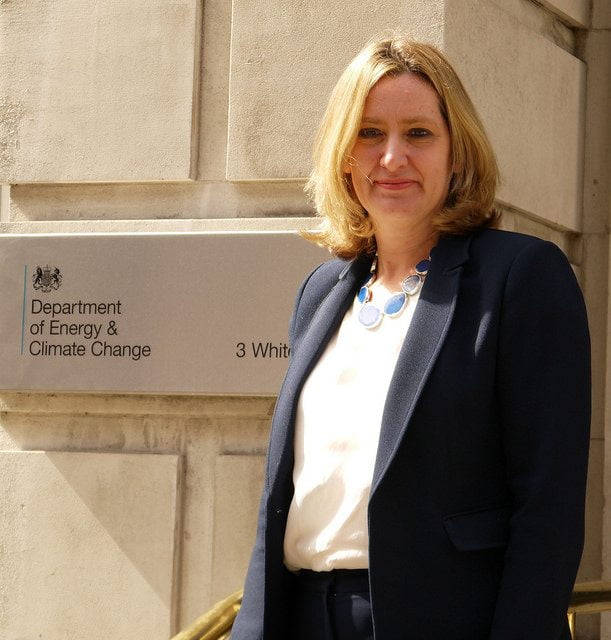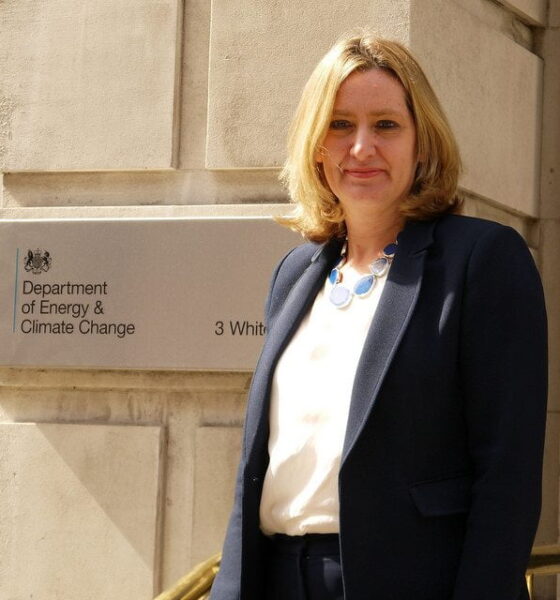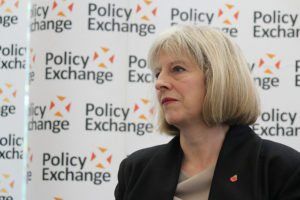

Energy
Amber Rudd, Secretary of State for Energy & Climate Change speech
Amber Rudd has spoken to the Conservative party conference in Manchester, in her capacity has Secretary of State for Energy & Climate Change. This is her speech in full.
“With a background in business, I have the utmost respect for the business women and men across our United Kingdom who are creating jobs and financial security for more working people and their families and helping us to build a stronger economy.
As a Government, it is our job to respond to the hopes and aspirations of working people and provide the stable, competent and sensible Government the British people rightly expect.
So, as a Conservative majority Government, we will drive forward our long-term plan to build a society with opportunity at its heart, where people know if they work hard, they can really succeed and we will back them.
We will get on with the job of delivering security, stability and opportunity for the people of Britain.
It’s clear to Conservatives that an affordable, secure supply of energy that our hardworking families and businesses can rely on now and in the future is the backbone of a thriving economy. It is fundamental to Britain’s security.
So, I am proud to stand before you as the first Conservative Secretary of State for Energy for more than 20 years.
Our challenge is to establish a sensible, long-term national energy policy that balances the need for cheap energy, the imperative to cut carbon and the necessity of secure energy supplies. Balancing these competing needs is not straightforward. And it requires a willingness to take decisions today for the good of tomorrow. It is decide or decline.
In 1997, we were close to completing the transformation of the energy market. The reforms, which spanned the government of Margaret Thatcher, were driven by a desire to keep people’s bills as low as possible. They smashed the inefficient state monopoly and encouraged competition and innovation. The changes were copied by nations around the world.
For Conservatives, our energy policy should once again be driven by the people who pay the bills. The consumer, the consumer, the consumer.
In the same way that Michael Gove and Nicky Morgan have made pupils and parents central to our education reforms, and Jeremy Hunt has put patients at the heart of how our hospitals and health service work, so we must do the same with energy and climate policy.
This work has already begun. I am clear that my Department is a pro-business, pro-growth Department that will champion the consumer.
Myself and my excellent team at DECC, Andrea Leadsom, Nick Bourne, supported by Paul Maynard, Sheryll Murray, Julian Smith and James Younger, are undertaking a root and branch review of our energy policies.
Getting a grip to protect families from endless worry about their energy bills.
First, this means providing secure supplies of electricity, oil and gas that will enable us to work through our long-term economic plan, and finish the job of securing our economic future.
That is why the Chancellor and I were in China recently, pushing for international investment in our nuclear infrastructure, woefully neglected under 13 years of Labour government.
And I’m delighted that the new National Infrastructure Commission, announced by the Chancellor today, will look at energy as part of its work to identify the investment our economy needs for long-term success.
And because we are a One Nation Government on the side of the consumer, we will relentlessly pursue competition.
When we took office in 2010, there were only a handful of tiny independent suppliers. The Big 6 had 99% of the market. Now there are more than 30 suppliers and the Big 6 are losing market share every quarter. We are now seeing local authorities like Nottingham setting up their own energy companies to help their residents get better deals. We want to make such innovation even easier.
Labour waffle about ‘democratising energy’. We are delivering it.
We want to ensure that we are doing everything we can to nurture competition so that it delivers cheaper bills and better customer service. That is why, under our Prime Minister David Cameron, the biggest investigation into competition in the energy market since privatisation was triggered. We will implement the recommendations of the Competition and Markets Authority to help ensure that we have an energy market that works for the consumer.
We have already cut the time it takes to switch suppliers in half. By 2018, people will be able to switch energy suppliers in just 24 hours.We are rolling out Smart Meters to help put households and businesses in control of their energy. Bills will be instant and accurate.
We will help keep people’s bills down by delivering our promise to insulate a million more homes over the next five years. And we are also determined to make sure the most vulnerable households are those most protected. We will be relentless in putting pressure on companies to improve how they treat their customers. Too many customers still suffer from woeful service at the hands of energy companies. Many households show their dissatisfaction by switching away. But we need to do more.
I can announce today that we will work with Ofgem and Citizens Advice to strengthen the Energy Ombudsman’s role. We want to give the Ombudsman real teeth so he can investigate systemic issues in the industry, not just individual complaints. Where companies have developed a pattern of bad behaviour, they will have no hiding place.
We are on the side of consumers, we are doing this so consumers receive better treatment and we can build more trust in the industry.
Our changes to low carbon subsidies since the election are also motivated by getting the balance right between supporting new, low carbon generation and protecting billpayers. We are clear that moving to a low carbon economy is key to our long-term economic and environmental prosperity. But I am also clear this must be done in the most cost-effective way possible.
While people support a transition to a low-carbon future, they don’t support this at any cost. There is no magic money tree. As we have already shown, we will be tough on subsidies. We said in our Manifesto that we would halt the spread of subsidised onshore windfarms. This would have been impossible in the Coalition. And six weeks into this Parliament, that’s what we did.
Subsidies have been cut and changes to planning rules mean that wind turbines should only get planning permissions if they have been clearly backed by local people. Promise made, promise delivered. Some have characterised these changes as motivated by ideological opposition to anything green. Nothing could be further from the truth. Our approach is very different to the hapless UKIP candidate who asked ‘But what happens when the renewables run out.’
An average of £7 billion has been invested each year in UK based renewable electricity since 2010. By 2020 we expect to get 30% of our power from renewable sources. We have solar panels on three quarters of a million roofs. With solar costs continuing to fall and new innovations in battery storage, renewable energy can stand on its own two feet. Indeed, the kind of transformation we need of our global energy system will only happen if low carbon energy becomes cheaper than the alternative.
I support cutting subsidies not because I am an anti-green Conservative, but because I am a proud green Conservative, on the side of the consumer.
Shale gas has led to dramatic reductions in US carbon emissions because it is cheaper without subsidy than the dirtier alternative. That is why we support the safe development of shale gas in the UK, because gas is going to be part of the transition to a low carbon economy. It’s also good for jobs; it’s part of our plan to build the Northern Powerhouse and ensure the potential of all parts of the UK is realised; and it’s good for our energy security.
The lesson for low carbon alternatives is clear. When green is no longer associated with extra costs and subsidy, as is close to happening with solar and onshore wind, cutting emissions will be easier. The only long-term way to resolve the real tension between affordability, security and low carbon is to discover low cost, low carbon technologies.
We need energy breakthroughs and Government has a part to play in supporting them. We must celebrate and back the businesses and innovators who will transform our energy system.
The engineers at Strathclyde University working with the Weir Group to master pumps and valves for shale wells sold across the world. The innovators that are helping to develop the foundations that can support giant turbines in the North Sea and to provide clean energy to our homes.
Those at Sheffield University’s Nuclear Advanced Manufacturing Research Centre working on the next generation of small modular reactors. With these and many more innovations taking place at our universities and in business across the UK we can become a home for energy innovation.
By 1997 we had transformed the energy market for the better of consumers. We won the argument and I am happy to take it on again.
Labour’s energy policy is riven with gimmickry. The anti-business, anti-competition nonsense of the price freeze. And as if that was not bad enough, a Labour leader who has also spoken of renationalising the energy sector at a cost to the taxpayer of £185 billion. £185bn!
“Turning the clock back”, I have to confess, not my words but the words of the former Labour Shadow Energy Secretary well, that’s something we can agree on!
Labour’s approach is about more spending, more borrowing, higher taxes. It is anti-consumer, anti-business, anti-taxpayer. A threat to our economic security and a threat to the security of hardworking families across our United Kingdom. And a distraction from the huge challenge of climate change.
I’ve said before that it simply cannot be left to one part of the political spectrum to dictate the solution. And some of the loudest voices have approached climate action from a left wing perspective. But it was Margaret Thatcher who first put climate change on the international agenda. A quarter of a century ago, she said: “The danger of global warming is real enough for us to make changes and sacrifices, so that we do not live at the expense of future generations.”
I could not have said it better myself. But the solutions must fit the rest of her creed: we must be…. tough on subsidies, pro-competition, anti-monopoly, pro-innovation and pro-consumer. Only then can we deliver the change we need.”
WWF-UK’s Head of Public Affairs Ben Stafford said: ‘We were pleased to hear Amber Rudd say she’s a proud green conservative. So let’s see an end to fossil fuel subsidies, a national push for energy efficiency, and renewable energy at the heart of the Government’s infrastructure plan.’


 Environment12 months ago
Environment12 months agoAre Polymer Banknotes: an Eco-Friendly Trend or a Groundswell?

 Features11 months ago
Features11 months agoEco-Friendly Cryptocurrencies: Sustainable Investment Choices

 Features12 months ago
Features12 months agoEco-Friendly Crypto Traders Must Find the Right Exchange

 Energy11 months ago
Energy11 months agoThe Growing Role of Solar Panels in Ireland’s Energy Future




























